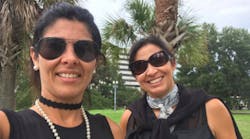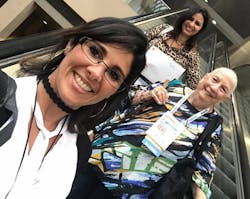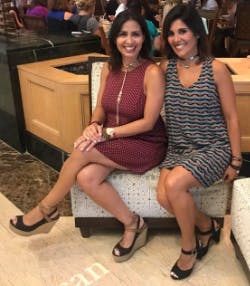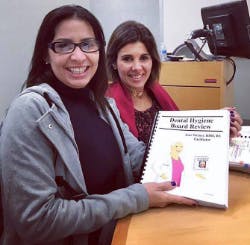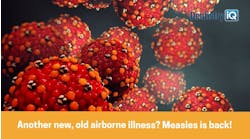From left, Sikiu Perez Aular, Glenda Serfaty, and Jane Weiner.
Two Venezuelan dentists who left the chaos of their own country in 2014 and 2015 have developed new careers as dental hygienists, and they are also helping other Hispanics who have entered the U.S. workforce by translating board review materials into Spanish.
Sikiu Perez Aular and Glenda Serfaty came to the United States to flee from the economic collapse in Venezuela. The South American country has also struggled with political unrest opposing its president, Nicolas Maduro.
Serfaty arrived in the United States first on October 14, 2014. Perez Aular arrived on Feb. 22, 2015. They settled in Broward County north of Miami in Florida.
“I brought two suitcases, some pictures, and my degree certificate,” said Serfaty.
As many international dentists do in Florida and other states, they examined the career options open to them in Florida.
Perez Aular said, “Before I arrived, I had a business plan with my husband and didn’t think about undergoing the process to become a dentist here in the United States. But because I missed my work, I started to research it and found dental hygiene as my new project.”
Serfaty added, “I had in my mind to become a dentist. But I didn’t know dental hygiene careers existed here in the U.S. In my country we don’t have such careers.”
Both became practicing dental hygienists in 2017. But the career change required the legal transition to switching careers, as well as the personal change of becoming U.S. residents. Both said they spent a year to “settle down” and “adapt.” Serfaty’s first residence was in Tampa before her family relocated to a Fort Lauderdale suburb. Perez Aular said her American experience began in a south Miami suburb before moving to the same neighborhood where Serfaty resides.
The two former dentists have known each other since their days as dental students in Venezuela.
“We have known each other for 15 years because of friendships in common and from university studies,” said Perez Aular. “We lost contact for a while and then, by surprise, we found ourselves on the same path. We met again when we took Jane’s English course as students.”
“Jane” is Jane Weiner, RDH, who among other notable accomplishments during her career, developed a board review program for dental hygiene students across the United States. Weiner, of course, does not teach “English” in addition to the typical questions found on a dental hygiene board exam. Her courses are presented in English. The courses, which also included the Florida law review, that the two former dentists participated in were instrumental in helping them obtain their dental hygiene licenses.
Serfaty said, “We help inform other colleagues about the dental revalidation processes on a voluntary basis, but we receive income from the courses we do with Jane. Currently we have projects together for the future in the field of education.”
Perez Aluar added, “We dedicate most of our working time to Jane’s courses. We also created chat rooms where we help colleagues start their process as an international dentist here in the USA. We manage a Facebook page, Instagram, Twitter, and WhatsApp groups. We are in touch with dentists from different Hispanic countries such as Venezuela, Colombia, Brazil, Cuba, Peru, Ecuador, Costa Rica, Dominican Republic, Mexico, Spain, and Argentina.”
Weiner admires the assistance that the two hygienists provides. Her board reviews consist of 14 lectures. While three lectures are still presented in English, Perez Aular and Serfaty conduct the remainder of the lectures in Spanish.
“Sikiu and Glenda know just how to teach well,” Weiner said. “They manage to have the attendees understand exactly what I have tried to impress as important in the courses. I am fortunate to have these two beautiful ladies on my team. I present three subjects in English and if they need translation for any of the attendees, Sikiu and Glenda translate at that time. We have a fee schedule so that the two girls can make an income that weekend.”
Both hygienists are married. Perez Aular has three daughters, ranging in age from two to 14 years old. Serfaty has a nine-year-old daughter. Both are glad that their families are far removed from the turmoil in Venezuela.
Serfaty said, “We left our country for not being in agreement with the politics of our president—for the high index of inflation, daily insecurity and lack of human rights, lack of food and medicines, and the decrease in the quality of education for our children.”
“We cannot live in peace having situations of imbalance around us,” Perez Aular said. “As a dentist, we could generate high income. But the problem was getting food, medicines, and basic necessities. Of course, I always felt fear for myself and my family, and I still feel it every time I see the news and remember my loved ones.”
